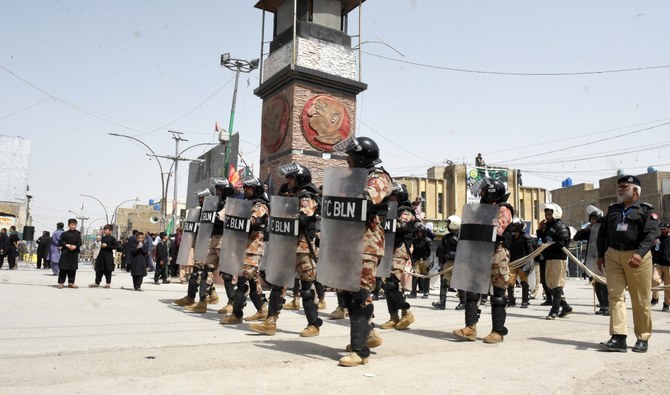ISLAMABAD: Leaders of the Pakistan Tehreek-e-Insaf (PTI) of jailed former prime minister Imran Khan have denied reports of internal rifts over the party’s recently launched anti-government protest campaign, saying the outfit remained united in its demand for Khan’s release.
On July 13, PTI announced a 90-day “do-or-die” protest drive against the government, days after 26 of its provincial lawmakers were suspended in Punjab and the Supreme Court rejected its appeal to reclaim reserved parliamentary seats for women and minorities.
The new protest campaign was launched by Ali Amin Gandapur, the chief minister of Khyber Pakhtunkhwa and a close Khan ally, but appeared to contradict an earlier call for a nationwide protest, posted on Khan’s official X account, set to culminate on August 5, marking the second anniversary of his imprisonment on corruption charges.
More questions emerged as senior PTI leader and Punjab Chief Organizer Aliya Hamza Malik publicly voiced concerns on X about a lack of clarity around the campaign. Malik questioned the origin of the 90-day plan and asked for details on the party’s strategy to secure Khan’s release. Khan has been in jail for nearly two years on multiple charges that he and his party say are politically motivated.
Arab News reached out to Malik for comment but received no response. However, PTI’s central spokesperson dismissed suggestions of internal divisions.
“There is no rift within the party as a whole, everyone is united on the agenda of ensuring Khan’s release, and the PTI is a large party where minor differences of opinion are natural and are part of a political culture,” PTI Central Information Secretary Sheikh Waqas Akram told Arab News. “A single statement can easily be blown out of proportion in this age of social media, but the reality is quite different.
“The party remains united under Khan’s leadership and is focused on a single objective, working for his release.”
Khan was ousted from the PM’s office in a no-confidence vote in April 2022 and jailed in August 2023. Since then, the PTI has repeatedly mobilized street protests, including a large march to Islamabad in November 2024, to demand his release and challenge the legitimacy of the February 2024 general election. The government accuses the PTI of using the protests to incite instability and disrupt efforts at economic recovery.
Asked about the structure of the current protest drive, Akram said the campaign had already begun, with each provincial chapter tasked with planning its own activities.
“All provincial chapters will finalize their protest plans within this week, and the goal is to build momentum leading up to August 5,” he said, declining further comment on the plans.
Earlier this month, Khan’s sister said his sons, Sulaiman and Kasim, who live in the UK, would join the campaign in Pakistan after returning from the United States. She said they would also raise awareness internationally, including in the US, about alleged human rights violations against Khan and PTI members.
Party leaders declined to provide updates on Sulaiman and Kasim’s plans.
“MINOR DIFFERENCES”
In the northwestern Khyber Pakhtunkhwa province where the PTI holds power, party leaders also denied any discord.
CM Gandapur’s announcement of the 90-day campaign was made “in coordination with the top leadership and in line with Khan’s directions,” said Malik Adeel Iqbal, PTI’s information secretary in the province.
“There are no differences within the party,” he told Arab News. “We are focused on finalizing our protest plans in KP, while Punjab will make its own plans. If anyone has any concerns, they should raise them with the central leadership or Khan, rather than making them public.”
Ali Imtiaz Warraich, PTI’s parliamentary leader in the Punjab Assembly, said “minor differences” stemmed from communication challenges due to limited access to Khan in jail.
“As it is difficult to contact Imran Khan and receive directions due to obstacles in leadership meetings with him, the emergence of minor differences is natural,” he said. “But there is no rift between the KP and Punjab chapters or their leadership.”
Warraich said the party’s unity was visible last week when a large number of PTI lawmakers from Punjab joined CM Gandapur at a meeting in Lahore when the 90-day protest plan was announced.
“We will organize our own protest plans in the province as per the directions of local and central leadership,” he said.
Asked whether the Punjab government would permit the protest campaign, provincial Information Minister Azma Bukhari said peaceful protest was a democratic right but accused the PTI of abusing that right in the past.
“PTI has a history of violence and anarchy,” she told reporters. “No political party is allowed to attack with weapons as Pakistan is our red line.”
“Politics should be kept above personal ego and self-interest and political issues resolved through political means,” Bukhari added.
Hundreds of PTI supporters were arrested after riots allegedly incited by the party against the military on May 9, 2023. The government also says four soldiers were killed in November protests last year. PTI denies the charges.
















